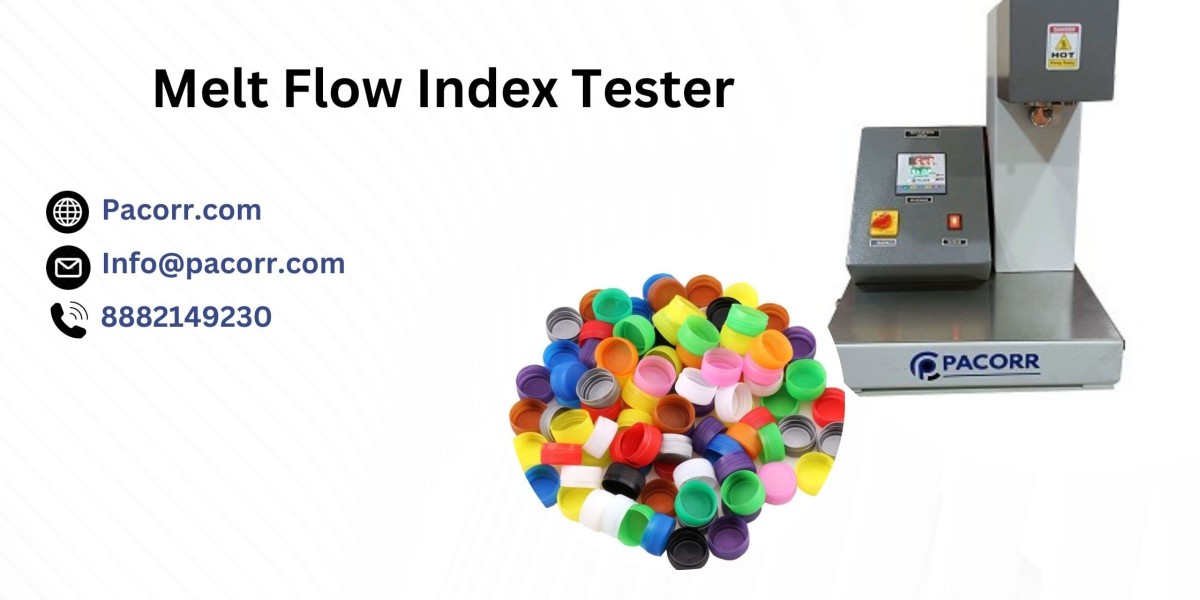What is a Melt Flow Index Tester?
A Melt Flow Index Tester is a specialized instrument used to measure the flow rate of a polymer melt through a specific capillary under controlled conditions. The result, known as the Melt Flow Index (MFI) or Melt Flow Index Tester, is expressed in grams per 10 minutes. This value is vital for assessing the viscosity and flow characteristics of the polymer, critical parameters in the manufacturing process.
Importance of Melt Flow Index Testing
1. Quality Control: MFI testing is a standard procedure for quality control in polymer production. It ensures the polymer's flow properties are within the desired range, essential for consistent product quality.
2. Material Selection: Knowing the MFI helps manufacturers select the appropriate polymer grade for specific applications, ensuring the end product has the required mechanical and physical properties.
3. Process Optimization: Understanding the flow properties of polymers allows manufacturers to optimize processing conditions, such as temperature and pressure, leading to more efficient production processes.
4. Compliance with Standards: MFI testing is often required to comply with international standards and regulations, ensuring products meet necessary specifications for safety and performance.
Working Principle of Melt Flow Index Tester
The Melt Flow Index Testing operates by extruding molten polymer through a die of specified dimensions under a pre-set load and temperature. The test involves the following steps:
· Sample Preparation: A specific amount of polymer is loaded into the tester's barrel.
· Heating: The barrel is heated to a pre-set temperature to melt the polymer.
· Application of Load: A weight is placed on the plunger, exerting pressure on the molten polymer.
· Extrusion: The polymer is extruded through the die, and the amount of extruded material is measured over a set period (usually 10 minutes).
· Calculation: The MFI is calculated by weighing the extruded polymer and expressing the result in grams per 10 minutes.
Benefits of Using Melt Flow Index Tester
· Accurate Measurement: The Melt Flow Index Tester provides precise measurements of polymer flow properties, aiding in accurate quality control.
· Ease of Use: Modern Melt Flow Index Testers are designed for user-friendly operation, making the testing process straightforward and efficient.
· Versatility: These testers can be used for a wide range of polymers, including polyethylene, polypropylene, polystyrene, and more.
· Cost-Effective: By optimizing material selection and processing conditions, the Melt Flow Index Tester helps reduce waste and improve production efficiency, leading to cost savings.
Choosing the Right Melt Flow Index Tester
When selecting an Melt Flow Index Tester Price, consider the following factors:
· Temperature Range: Ensure the tester operates within the temperature range required for your specific polymers.
· Load Capacity: The tester should accommodate the necessary load weights for your testing requirements.
· Accuracy and Precision: Look for a tester with high accuracy and precision to ensure reliable results.
· Ease of Calibration: A tester with simple calibration procedures saves time and reduces the likelihood of errors.
· Compliance: Verify that the tester complies with relevant industry standards, such as ASTM D1238 and ISO 1133.
Conclusion
The Melt Flow Teste is an essential tool in the polymer industry, providing valuable insights into the flow properties of materials. By ensuring consistent quality, optimizing processes, and aiding in material selection, this device significantly enhances the efficiency and performance of polymer manufacturing. Investing in a high-quality Melt Flow Index Tester is a wise decision for any polymer manufacturer aiming to meet industry standards and deliver superior products.
FAQs about Melt Flow Index Tester
Q1: What is the purpose of the Melt Flow Index (MFI) test?
The MFI test measures the flow rate of a polymer melt under specified conditions, helping to assess the material's viscosity and flow characteristics. This information is crucial for quality control, material selection, and process optimization in polymer manufacturing.
Q2: How is the Melt Flow Index (MFI) calculated?
The MFI is calculated by measuring the weight of polymer extruded through a die over a set period (typically 10 minutes) and expressing the result in grams per 10 minutes.
Q3: Why is the MFI test important for quality control?
The Melt Flow Index Tester ensures that the polymer's flow properties are within the desired range, guaranteeing consistent product quality and compliance with industry standards.
Q4: What factors should be considered when choosing a Melt Flow Index Tester?
Consider factors such as temperature range, load capacity, accuracy and precision, ease of calibration, and compliance with industry standards when selecting a Melt Flow Index Tester.
Q5: Can the Melt Flow Index Tester be used for different types of polymers?
Yes, the Melt Flow Index Tester is versatile and can be used for a wide range of polymers, including polyethylene, polypropylene, polystyrene, and others.
Q6: How does the Melt Flow Index Tester contribute to cost savings in polymer manufacturing?
By providing accurate measurements of polymer flow properties, the Melt Flow Index Testing helps in optimizing material selection and processing conditions, reducing waste and improving production efficiency, which leads to cost savings.








